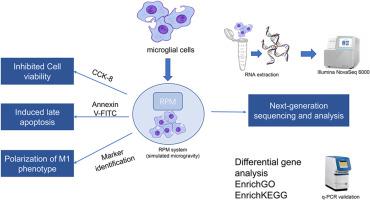当前位置:
X-MOL 学术
›
Acta Astronaut.
›
论文详情
Our official English website, www.x-mol.net, welcomes your feedback! (Note: you will need to create a separate account there.)
Transcriptome sequencing reveals the promotion of apoptosis and M1 polarization of microglia under simulated microgravity
Acta Astronautica ( IF 3.5 ) Pub Date : 2024-04-02 , DOI: 10.1016/j.actaastro.2024.03.056 Hui Yu , Xu-Yi Jia , Li-Na Gao , Ting Huyan , Jian-Jun Gou , Chun-Lin Gong , Liang-Xian Gu
Acta Astronautica ( IF 3.5 ) Pub Date : 2024-04-02 , DOI: 10.1016/j.actaastro.2024.03.056 Hui Yu , Xu-Yi Jia , Li-Na Gao , Ting Huyan , Jian-Jun Gou , Chun-Lin Gong , Liang-Xian Gu

|
The exponential progress in the field of space science and technology has facilitated the prolonged habitation of astronauts in the space environment. However, the neurological and cognitive impairments of astronauts have become major factor that directly impede the successful completion of space missions. Studies have demonstrated that microgravity can diminish neuronal functions and cognitive abilities by altering the microenvironment of the brain (BME). Microglia, vital immune cells responsible for regulating the integrity of the blood-brain barrier, have been identified as the principal contributing elements to the neurological deterioration observed in microgravity conditions. The primary objective of this study was to provide an understanding of the molecular processes underlying the behavior of microglia under conditions of microgravity. Using a Random Positioning Machine (RPM) to simulate microgravity, our study found that microgravity reduces BV2 microglial cell viability, induces M1 polarization, and significantly increases late apoptosis. Transcriptome analysis revealed 142 differentially expressed genes related to microglial phenotype and inflammation, with qPCR validating selected DEGs. These results elucidate the molecular mechanisms of microglial behavior under microgravity, highlighting gene expression changes and cellular damage. This study provides a conceptual framework for comprehending the influence of microgravity on the neurological system, establishing countermeasures against functional damage to the nervous system caused by space flight, and serving as a reference for future deep space exploration and long-term manned space medical support.
中文翻译:

转录组测序揭示模拟微重力下小胶质细胞凋亡和M1极化的促进
空间科学技术领域的突飞猛进,方便了宇航员在太空环境中的长期居住。然而,宇航员的神经和认知障碍已成为直接阻碍航天任务顺利完成的主要因素。研究表明,微重力可以通过改变大脑微环境(BME)来削弱神经元功能和认知能力。小胶质细胞是负责调节血脑屏障完整性的重要免疫细胞,已被确定为微重力条件下观察到的神经功能恶化的主要影响因素。这项研究的主要目的是了解微重力条件下小胶质细胞行为的分子过程。我们的研究使用随机定位机 (RPM) 模拟微重力,发现微重力会降低 BV2 小胶质细胞的活力,诱导 M1 极化,并显着增加晚期细胞凋亡。转录组分析揭示了 142 个与小胶质细胞表型和炎症相关的差异表达基因,并通过 qPCR 验证了选定的 DEG。这些结果阐明了微重力下小胶质细胞行为的分子机制,突出了基因表达变化和细胞损伤。该研究为理解微重力对神经系统的影响、建立针对航天飞行对神经系统功能损伤的对策提供了概念框架,为未来深空探测和长期载人航天医疗保障提供了参考。
更新日期:2024-04-02
中文翻译:

转录组测序揭示模拟微重力下小胶质细胞凋亡和M1极化的促进
空间科学技术领域的突飞猛进,方便了宇航员在太空环境中的长期居住。然而,宇航员的神经和认知障碍已成为直接阻碍航天任务顺利完成的主要因素。研究表明,微重力可以通过改变大脑微环境(BME)来削弱神经元功能和认知能力。小胶质细胞是负责调节血脑屏障完整性的重要免疫细胞,已被确定为微重力条件下观察到的神经功能恶化的主要影响因素。这项研究的主要目的是了解微重力条件下小胶质细胞行为的分子过程。我们的研究使用随机定位机 (RPM) 模拟微重力,发现微重力会降低 BV2 小胶质细胞的活力,诱导 M1 极化,并显着增加晚期细胞凋亡。转录组分析揭示了 142 个与小胶质细胞表型和炎症相关的差异表达基因,并通过 qPCR 验证了选定的 DEG。这些结果阐明了微重力下小胶质细胞行为的分子机制,突出了基因表达变化和细胞损伤。该研究为理解微重力对神经系统的影响、建立针对航天飞行对神经系统功能损伤的对策提供了概念框架,为未来深空探测和长期载人航天医疗保障提供了参考。



























 京公网安备 11010802027423号
京公网安备 11010802027423号